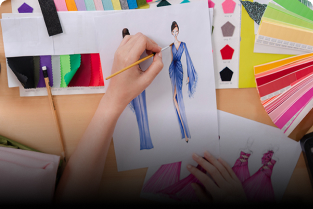Fashion designing is more than just sketching clothes — it’s a dynamic blend of creativity, technical knowledge, and business sense. If you’re planning to pursue a course in fashion designing, you might be wondering: What exactly will you study? The curriculum is carefully structured to develop your artistic vision while equipping you with the practical skills needed to succeed in the fashion industry.
Let’s take a closer look at the core subjects taught in fashion designing courses.
1. Fashion Illustration and Drawing
This subject forms the foundation of your creative expression.
-
Teaches sketching techniques for garments and accessories
-
Focuses on body proportions, garment rendering, and fabric textures
-
Helps in visualizing and communicating design ideas effectively
2. Textile Science
Understanding fabrics is crucial for any fashion designer.
-
Covers different types of natural and synthetic fibers
-
Teaches fabric properties like drape, stretch, durability, and colorfastness
-
Includes dyeing, printing, and textile finishing techniques
3. Pattern Making and Garment Construction
From concept to creation, this subject makes your design wearable.
-
Teaches how to draft patterns based on measurements
-
Covers stitching techniques, garment fitting, and finishing
-
Involves the use of sewing machines and tailoring tools
4. Fashion History and Costume Studies
To innovate, you must understand the past.
-
Explores historical fashion trends and movements
-
Analyzes fashion evolution across cultures and centuries
-
Provides inspiration for modern design by studying past styles
5. Fashion Marketing and Merchandising
This is where creativity meets commerce.
-
Covers branding, promotion, and retail management
-
Teaches consumer behavior, trend forecasting, and pricing
-
Prepares students for roles in fashion business and marketing
6. Computer-Aided Design (CAD)
Technology is a big part of modern fashion.
-
Teaches design software like Adobe Illustrator, Photoshop, and CorelDRAW
-
Used for digital fashion sketches, tech packs, and mood boards
-
Helps streamline design presentation and production processes
7. Surface Ornamentation and Embellishment
For designers who love detail and handwork.
-
Covers embroidery, beadwork, sequins, fabric painting, and applique
-
Focuses on enhancing the aesthetic appeal of garments
-
Encourages creativity in decorative design
8. Fashion Styling and Image Design
Fashion is not just about clothes — it’s about looks.
-
Teaches styling principles for individuals and editorials
-
Covers makeup, accessories, body shapes, and personal branding
-
Useful for careers in fashion shoots, media, and celebrity styling
9. Portfolio Development
Your portfolio is your ticket to the fashion world.
-
Helps compile and present your best design work
-
Focuses on layout, storytelling, and concept presentation
-
Essential for internships, jobs, or launching your own label
10. Internship and Industry Exposure
Practical experience is a must in fashion.
-
Involves working with fashion houses, designers, or retail brands
-
Offers hands-on experience in real-world settings
-
Helps build connections and industry insight
Optional or Elective Subjects
Depending on the institute, you might also study:
-
Fashion Photography
-
Sustainable Fashion
-
Luxury Brand Management
-
Visual Merchandising
-
Entrepreneurship
Final Thoughts
Fashion designing is a multi-disciplinary field that balances creativity, craftsmanship, and commercial awareness. The subjects taught prepare you not just to design beautiful clothes, but to understand the fashion industry inside out.

